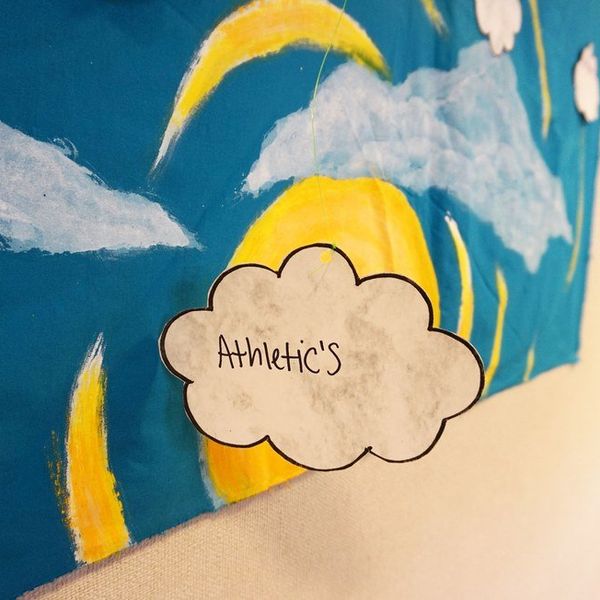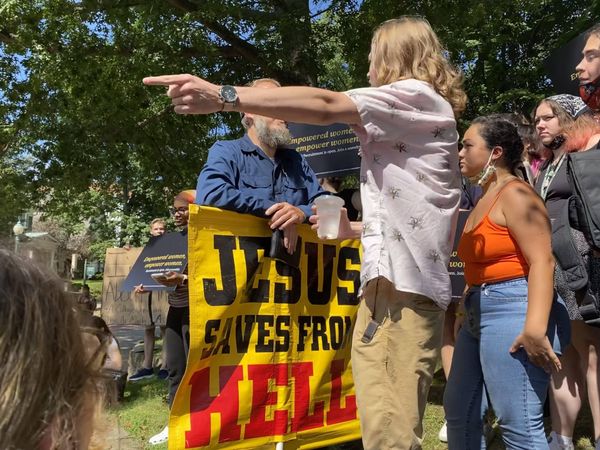When Brother Jed Smock and his group of sidewalk preachers from The Campus Ministry USA came for their third visit at DePauw University on Friday Oct. 16, students mostly ignored them. A few heckled Smock and company, but mostly, whether it be because of Fall Break or midterms, students just walked past them.
Throughout the first two visits, I've had a lot of contact with Smock and company. They know me by name and greet me as I stand watching everything unfold. What I have found is that Smock and other members of The Campus Ministry USA are completely different when you talk to them on an individual level. They are far gentler, and the love in their message, which isn't conveyed when they're screaming on sidewalks, shines through.
On Friday, I did something that was met with great disapproval by members of the administration and even DePauw University Public Safety officers. I suspect that my peers will also express displeasure in my actions. I walked up to the barricade (this time only required one barricade, which meant that I could be closer to them), and I handed them a few sandwiches and beverages from the campus dining hall. I did so for several reasons.
Though this is not the primary reason, the one that is easiest to explain involves Smock and company's visit to Wabash College a few weeks ago. Students at Wabash brought them water and sandwiches. There is a huge rivalry between DePauw and the all-male college just more than 30 miles to the north. Each year, we compete in a football game where the winner receives a huge locomotive bell called The Monon Bell that is passed back and forth. The rivalry parallels that of The University of Notre Dame and The University of Michigan's but on a Division 3 level. The idea that Wabash was able to one-up DePauw at anything irked me, and the simple solution was to follow their lead and bring Smock and company something to eat and drink.
The other two reasons are more meaningful.
I'm a Christian, and as such, I believe that God calls me and other Christians to universally show the love of Christ to others. You don't just turn this outpouring of love on or off depending on who it's directed towards. It's not a light switch. Doing so is the very opposite of showing Christ's love because He showed love through corporal works of mercy to everyone, from the sinners to the pharisees and every possible person in between.
So, I followed Christ's footsteps and did two of the seven corporal works of mercy: feeding the hungry and giving drink to the thirsty.
The important message here is that you don't have to agree with everything regarding a person or a group of people to show them Christ's love. I don't 100 percent agree with the tactics that Smock and his group use, and I think, after several conversations with me in which I questioned their tactics, they know I am dubious at best. I think that if they turned in their signs reading "You promote rape" and "Yoga pants are a sin" for something like "Ask me about Jesus Christ," they would be far more effective. Each of them have a remarkable testimony that has the power to change the hearts and minds of others. It has the ability to bring others to Christ. A small change might mean that their message wouldn't fall on deaf ears. They could openly rebuke sin while still demonstrating Christ's love. But I doubt what I think matters because Smock has spent more years doing sidewalk preaching than I have even been alive, and really that's neither here nor there.
I know that bringing Smock and company a few meager sandwiches and cold drinks made a difference. In his daily recap note, he wrote that I was "the only known Christian that [they] have met in [their] three visits to DePauw." I'm sad that my brothers and sisters in Christ at DePauw, which even include some members of the faculty and staff, failed to demonstrate Christ's love to Smock and company. It leaves Smock and company with a false impression of what the Christian community at DePauw looks like.
But my obligation to be kind to Smock comes from DePauw too.
Discouraging other students and I from talking to Smock not only prioritized Smock's utilization of First Amendment rights over our own, but quite frankly it went against everything that DePauw is supposed to stand for. My university's administration, faculty and staff failed in upholding the very purpose and mission of the institution that I call home.
DePauw's mission states that the university "provides a diverse learning and living community which is distinctive in its rigorous intellectual engagement and international and experiential learning opportunities."
This mission was adopted by the Board of Trustees in January 2006.
If you just looked at the mission statement, it would be easy to assume that it is only DePauw's mission to foster rigorous intellectual engagement inside the classroom. But the purpose and aims of DePauw, which is an institutional statement approved by the faculty expands on the spirit behind this mission statement:
"The general intellectual aims of the University are to seek truth and educate minds. To these ends the members of the University strive:
- to foster the love of learning and the increase of knowledge and to recognize and support intellectual and creative excellence;
- to enlarge capacities for clear, thorough and independent thought;
- to understand and appreciate cultural and scientific achievements, past and present;
- to encourage serious reflection on the moral and ethical aspects of experience;
- to respect and sustain the freedom of inquiry and speech; and
- to demonstrate integrity and honesty, courage and compassion in academic work and in the activities of the University generally and in all such matters to be open to the views of others.
These intentions shape the pattern of DePauw University's environment and direct its activities. Students and deans, staff and alumni, faculty and president are all members of a community whose governance they share."
It was understandable why DePauw prevented students from engaging in an intellectual conversation with Smock during the first two visits. Students were angry, and there wouldn't have been any intellectual conversation whatsoever. But this time, students generally didn't care about Smock's presence or message.
Yet students who wanted to engage in peaceful, intellectual conversation were discouraged from doing so. The university didn't prevent them; they couldn't legally do that any more than they could make Smock leave the sidewalk or necessarily stay inside the barricade.
DePauw doesn't have an obligation to protect students from unpopular or even unfavorable ideas. Students are not children that need to be shielded from these ideas, especially when it is within their Constitutional rights. Instead, DePauw has an obligation to create an environment that fosters intellectual and personal growth. But the simple act of discouraging students from conversing with Smock or asking students to continue with their day is enough to stifle the creation of such an environment.
I went ahead and brought the sandwiches and conversed with Smock and company. My kindness and compassion was met kindness and compassion.
When I walk across the stage at graduation in May, President Brian Casey will read a charge to the recent graduates. This charge has been read to every graduating class at commencement. The charge ends with the following lines:
"Whatsoever things are true,
Whatsoever things are just,
Whatsoever things are pure,
Whatsoever things are lovely,
Whatsoever things are of good report,
If there be any virtue, and if there be any praise, think on these things."
This charge isn't just meant for the graduating class at commencement. It's simply a reminder of the type of person that DePauw was supposed to encourage them to be as they leave DePauw. This charge is meant for anyone in any way affiliated with the institution, whether that be as alumni, current students or faculty and staff of DePauw.





















